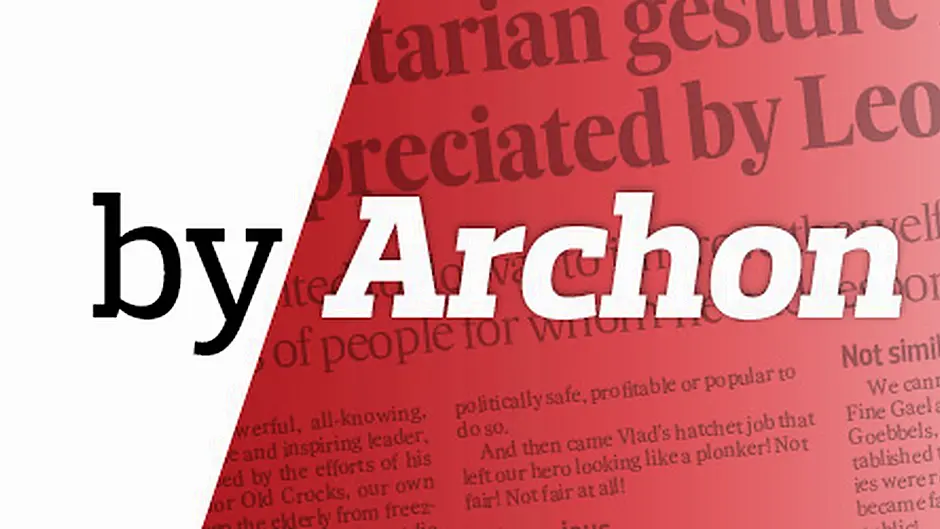Labelling as ‘terrorist' immediately indicates profound antipathy towards the cause or the people concerned
Here's an interesting one: After much contemplation and investigation, experts from University College Cork and the University of East London discovered that there’s little or no overlap between people arrested for jihadi terrorism and republican ’terrorism.’
But the academics also revealed that criminal behaviour has overtaken ‘terrorist networks’ and converted them into ‘ordinary crime syndicates,’ an opinion equally promoted by the Inspector Plods, North and South.
In a neatly brief and concise 494-word report for a right-wing European think tank, GLOBSEC, the university boffins make the point that there is wide divergence in the type of crime committed by ‘republicans’ and that of ‘Irish jihadists.’
‘Troubles-related individuals’ in the IRA, they assert, generally are engaged in ‘fuel smuggling and drug dealing,’ while the jihadi guys have a habitual liking for social welfare fraud. They remark that evidence of the petty crime committed by both groups was ‘gleaned from official but unverified sources,’ but add that there is no evidence of criminal activity being carried out with a view to funding extremism or terrorism, nor is there evidence of a coordinated effort to engage in criminal activity in group/gang activity.
Interesting too that in their report, entitled ‘From Criminals to Terrorists and Back,’ the authors note the absence of any ‘foreign-fighter experience’ among those arrested for ‘terrorism’ in 2015.
The report, which was written by John Morrison of the University of East London and Orla Lynch of UCC, is a component part of a research project in 11 EU countries conducted by GLOBSEC.
A quibble
And very interesting it is too, but we have a quibble – the use of the word ‘terrorism’:
‘Tell me what you think about terrorism, and I will tell you who you are,’ said the eminent historian of the IRA, J Bowyer Bell, implying that to label a person or an organisation as ‘terrorist’ immediately indicates that one has a profound antipathy to the cause or the people concerned.
In fact there is no standard definition of ‘terrorism’ that everyone agrees with. After all, one man’s terrorist can be another’s freedom fighter.
It is the most commonly misused of toxic words and should be treated in the same way as one does with a hot potato, very gingerly, when the word is employed as a generic term in social science research. The authors of the report fail to do that.
As any student of recent Irish politics knows, the word ‘terrorism’ delegitimises and demonises the actions of individuals and groups, and makes it easier to perceive people as opponents and enemies.
For instance, when Gerry Adams legitimately was attempting to achieve political and ideological goals, the political Establishment and media never ceased to depict him as a ‘terrorist’; yet today, the same Establishment celebrates Adams as an outstanding statesman who brokered the Good Friday Agreement.
Criminal behaviour
Ironically, as recently as five years ago, Adams the ‘terrorist’ was considered not kosher enough to be admitted to the halls of political ‘respectability.’ Consequently, the Irish media saw nothing inconsistent in their non-reporting of his pall-bearing role at the funeral of Nelson Mandela, a revolutionary once depicted as a bloodthirsty ‘terrorist’ before becoming the darling of the media.
Indeed, it’s somewhat difficult to establish with any certainty the purpose of the document ‘From Criminals to Terrorists and Back.’ But the organisation that sponsored it, the James Bond-sounding GOBSEC, certainly is one to watch, describing itself as ‘independent, non-partisan, and non-governmental on foreign and security policy,’ but which comes across as free market, pro-NATO and menacingly anti-Russian.
Curious too that GOBSEC’s research into ‘terrorism’ was funded by the world’s largest tobacco company, the cigarettes conglomerate Philip Morris, which cancer sufferers might describe as a heart and lungs ‘terrorist’.
The multinational fags industry has spent millions fighting the plain packaging of cigarettes and, at one stage, disgracefully intimated to the Irish government that our economic recovery could be undermined if we proceeded with plain packaging. Which makes the sight of right wing loot being generously funnelled into a UCC academic report rather unsettling.
Right-wing bias
GLOBSEC’s primary function seems to be that of feeding a steady supply of conservative opinion into the EU and, more importantly, of creating the impression that there is a groundswell of support for a conservative bias in politics right across Europe.
The organisation, which this year met in Bratislava, Slovakia, considers itself to be ‘one of the top strategic forums worldwide for connecting the realms of politics, academia, the non-government sector and business’; and for constructing ‘a truly global policy-making platform.’ Within that context, the very close connection that it has with University College Cork is fascinating; as to desirable, well, that’s another day’s work.
Famous people
GLOBSEC boasts of having on board the former British prime minister and flop, David Cameron, and the former presidents of basket-case countries, such as Slovenia, Poland, Georgia, Estonia and Macedonia.
Also a fan was Zbigniew Brzezinski, the hawkish strategic theorist to President Lyndon Johnson who boasted that ‘In Iraq we must succeed. Failure is not an option.’ He famously pumped billions in military aid for Islamic fanatics fighting Soviet troops in Afghanistan and, indirectly, was responsible for creating the ISIS monster.
Another supporter is Madeleine Albright, the first woman to become the US Secretary of State. She’s famous for arrogant bluster such as: ‘If we have to use force, it is because we are America. We are the indispensable nation. We stand tall. We see further into the future.’
Prominent too is Rose Eilene Gottemoeller, who is the current Deputy Secretary General of NATO. In there too are Anders Fogh Rasmussen, former Secretary General of NATO, Donal Tusk, and Mevlut Cavusoglu, former Turkish Minister for Foreign Affairs, who in 2017 was banned from landing in Rotterdam over remarks he made about the way the Netherlands was treating Turkish immigrants. The Dutch said he was a threat to public safety!
Oh, and let’s not forget the Rt Hon Baroness Neville-Jones, former chairman of the British Joint Intelligence Committee and Minister of State for Security and Counter Terrorism in the Home Office. She was the very happy non-executive chairman of the part government-owned defence technology company QinetiQ, which was privatised for £1.3 billion in 2006.
Guns and drums
But, probably, the most intriguing aspect was this year’s closed session that had the title ‘European Armoury Aspect – Another Piece of the Puzzle for the European Defence Union.’ The major participant was the German defence company, Krauss-Maffel Wegmann (KMW) which produces the Leopard 1 main battle tank, the Leopard 2 main battle tank, the PzH 2000 self-propelled howitzer, the Flugabwehrkanonenpanzer Gepard or Flakpanzar, a self-propelled anti-aircraft gun; the Dingo 1 & 2 infantry mobility vehicle and the Panzerschnellbrucke 2.
Perhaps the experts from the groves of academe might tell us what’s really going on?







